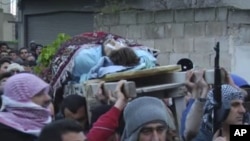Syrian activists say government troops have killed scores of civilians in Homs, continuing a months-long siege of the city that has been a hub of protests against President Bashar al-Assad's 11-year autocratic rule.
The Britain-based Syrian Observatory for Human Rights said the shelling Wednesday also heavily damaged more than 20 buildings in the city's Baba Amr district. The bombardment follows days of assaults on Homs that activists say killed hundreds of people.
Casualty figures cannot be confirmed because Syria restricts independent reporting.
Russian visit
Russian Foreign Minister Sergei Lavrov said Wednesday that a solution to the crisis through a national dialogue should come from Syrians themselves and that it is not up to the international community to decide the outcome of such talks in advance.
During a Tuesday meeting in Damascus, Assad said he wants Vice President Farouk al-Sharaa to head up talks with the opposition.
Efforts by the Arab League and Russia to organize talks have been rejected by Syrian opposition groups angered by the Assad government's deadly crackdown on the 11-month-old uprising.
Lavrov said Tuesday that Assad will push ahead with promised reforms and soon set a date for a referendum on a new constitution aimed at broadening political participation.
US criticism
U.S. State Department spokeswoman Victoria Nuland said Tuesday it is hard to believe Assad's latest reform pledges as his forces continue to bombard civilians. The Obama administration shut its embassy in Damascus Monday as part of a Western and Arab campaign to isolate Assad diplomatically and pressure him into stopping the crackdown.
White House Press Secretary Jay Carney said Tuesday Washington also is exploring the possibility of providing humanitarian aid to Syrians, in cooperation with U.S. allies. He did not elaborate. Western powers and Arab nations have repeatedly said they do not want to intervene militarily in the Syrian crisis.
Ambassadors recalled
France, Italy and Spain recalled their ambassadors to Syria on Tuesday, citing the Assad government's continued repression. The six Gulf Cooperation Council states, led by Saudi Arabia, also announced they are withdrawing their ambassadors from Damascus and expelling Syrian envoys in response to the worsening violence.
Syrian activists say the international community's words and actions are not enough.
Syrian activist and engineer Abo Emad, who did not want his real name to be used, spoke with VOA via Skype Tuesday from the basement of a building in Homs where he was taking cover from the shelling with about 20 other people. He said the Syrian people have lost confidence in the international community.
"They're saying that they're all partners in killing us," he said. "Even the Security Council. Even the United Nations."
He said Syrian security forces were bombing everything, including homes, schools and mosques.
"They surrounded the area by snipers, and they're shooting at everything that moves," added Abo Emad. "Even the cats."
Terrorists blamed
The Syrian government blames the violence on "armed terrorists" bent on dividing and sabotaging the country.
Turkey said Tuesday it will launch a new initiative to address the situation in Syria. Turkish Foreign Minister Ahmet Davutoglu is due to arrive in Washington Wednesday for talks with U.S. Secretary of State Hillary Clinton, who has said the United States would work with other nations to tighten sanctions against Assad's government and deny it arms in the absence of a U.N. resolution.
On Saturday, Russia and China vetoed a Western and Arab-backed U.N. Security Council resolution that would have endorsed an Arab League plan for Assad to step aside, order his troops to stand down and enact democratic reforms. Moscow and Beijing said they blocked the measure because they perceived it as taking sides in a domestic conflict and providing a possible pretext for foreign military intervention.
Some information for this report was provided by AFP and Reuters.
| Join the conversation on our social journalism site - Middle East Voices. Follow our Middle East reports on Twitter and discuss them on our Facebook page. |




